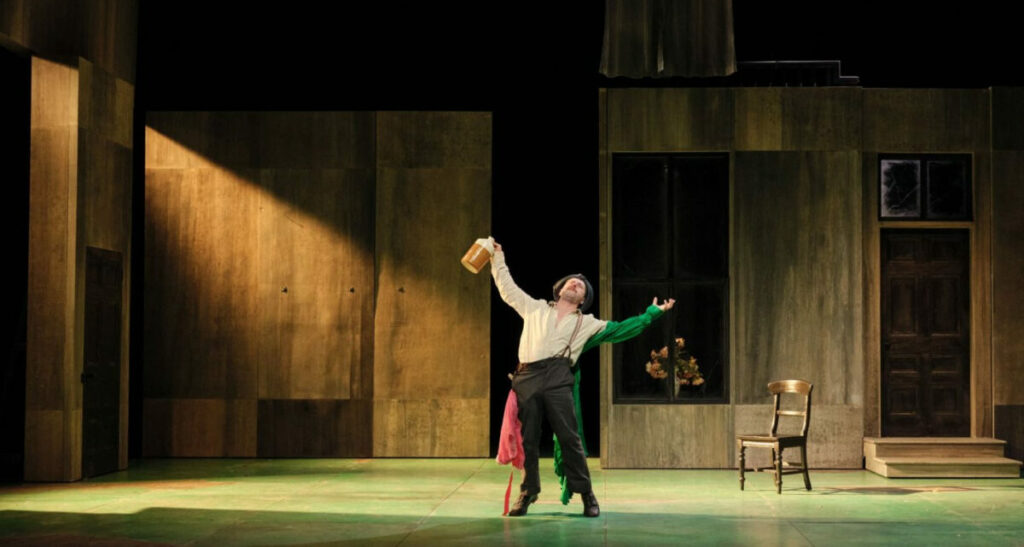
“That’s the Irish People all over ― they treat a serious thing as a joke and a joke as a serious thing.”
Seán O'Casey, The Shadow of a Gunman
Comradaithe,
I address you in the spirit of Seán O’Casey!
I hope many of you were able to see the Druid production of Seán O’Casey’s Dublin Trilogy in either New York or Ann Arbor. It was another extraordinary accomplishment by the Galway-based theatre company, propitiously staged as the Decade of Centenaries commemorations draw to a close.
To see the plays together is to see how a master dramatic craftsman used all his tools and tricks –from musical ditties, off-stage action and sound; colloquial, lower-class Irish speech, tenement living rooms, run-down pubs, family bickering, and spousal arguments –to begin his plays with hilarity and end them in tragedy. Farce and futility, pretension and real loss: this is the arc of O’Casey’s plays, enacted by characters who think they might control the bits and pieces of lives already stranded on the lowest rung of the economic ladder.
A case in point: Nora, the young wife in Plough and the Stars, wants the lock to her tenement flat fixed so she can keep her nosy and critical neighbors out and her problematic relatives in, a goal that at first seems small and possible. Of course, it is 1916, and she cannot insulate her small domestic realm from the larger political one.
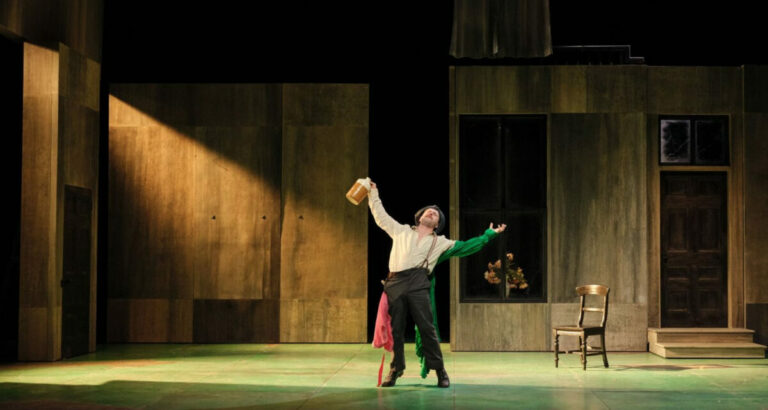
By the end, her husband has died in the uprising, the child she is carrying is stillborn, her Protestant neighbor is killed by a British soldier and the play has us wondering about who are the heroes and who are the victims in this liberatory struggle. In the great political movements—or even in domestic conversations– does anyone ask where is the real suffering?
O’Casey had a consistent answer: look at the poor, look at the tenement, look at the struggling women and dying children. See the contrast, and implicit rebuke, of a tenement flat inside a Georgian mansion. O’Casey called himself a ‘flying wasp,” and his plays, however funny, pricked the conscience of the original audiences. They still do.
Garry Hynes, the Druid’s Tony-award winning artistic director, took on the monumental and unprecedented task of staging the three plays back-to-back in the chronological order of their subjects, not in the time of their composition or first performances. The three plays depict the three key events on which the modern Republic was founded – the Easter Rising (Plough and the Stars), the War of Independence (Shadow of a Gunman), and the Civil War (Juno and the Paycock).
The works have been staged individually with Plough and Juno becoming a staple of the Abbey repertoire as reliable box office draws. Now re-invigorated, DruidO’Casey is a seminal event for Irish theater in Ireland and North America.
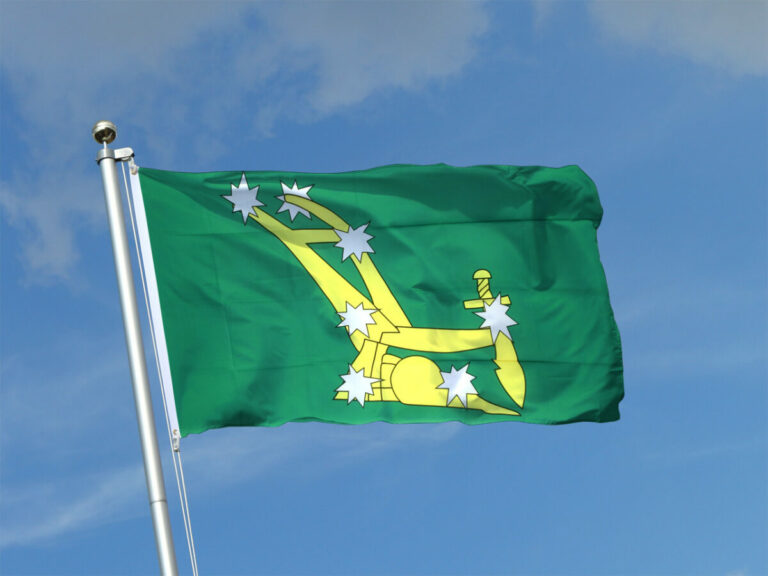
O’Casey had an insider’s understanding of Dublin tenement life, as well as what early republicanism meant for its sometimes-fulsome advocates. He was one of thirteen children, of whom five survived, born to poor Protestant parents in Dublin in 1880. His father died when O’Casey was six, and O’Casey, left school at fourteen, barely able to read, in part due to terrible eyesight. His daughter, Shivaun recounts how he memorized the complete texts of four Shakespeare plays.
Scrapping for employment, he eventually worked for the railroad. He was excited by the Gaelic Revival and the Irish cause. He joined the Irish Revolutionary Brotherhood, took up the uillean pipes, and Gaelicized his name.
Energized by the revolutionary socialism of Jim Larkin and James Connolly, O’Casey was one of the founders of the Irish Citizens Army, with the Starry Plough as its flag. The Abbey Theatre, founded as a national theater and thus advancing cultural nationalism as the corollary to political action, staged all three of his Dublin plays.
At that time, the deathrate in Dublin was very high, and nearly one third of Dubliners lived in crowded, unsanitary, even officially condemned, tenements. It was preferable, went one observation, to get a cot in Mountjoy prison. Among the many incarcerated were those convicted under the 1908 Children’s Act, for neglecting their children—when massive unemployment rates raged.
Life treated women especially harshly: they coped with alcoholism, unemployed husbands, malnourished and ill children, and the extra relatives who moved in. They turned to becoming street sellers, laundresses, and prostitutes, afraid of the police and the clergy.
A National Archives website with photos from the early 1900s offers street-by-street accounts of tenement conditions.
“Poverty was the preserve of no creed,” the archivists state, with Protestants, Methodists, and Presbyterians living among the majority Catholics.
O’Casey depicts the unalleviated desperation in his Dublin trilogy, as even just a glance of the cast of characters reveals. Juno, especially, shoulders the care of her hunted son, pregnant daughter, and alcoholic husband, until it breaks her.
That these characters have no notion of how to address their crushing poverty, except through delusion or drink, is the source of their tragedy. They grasp thin straws of hope, such as an unexpected inheritance in Juno, but however voluble, they cannot articulate how republican movements have failed them or how colonial powers have killed them.
Later in life, O’Casey wrote to his American publisher: “I’ve never written anything that didn’t cause a dispute, a row, a difference of something.”
Such was the case for his characters, comically arguing about the trivial while tragically failing to identify their British and Irish oppressors.
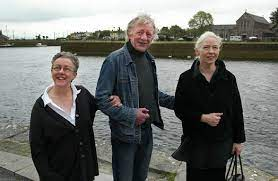
The brilliant Garry Hynes (Roscommon) co-founded the Druid Theatre in 1975 with her UCG (now University of Galway) classmates, Mick Lally (Mayo) and Marie Mullen (Sligo). Their ambition was to establish a specifically West of Ireland company. All three have had notable successes apart from Druid.
Lally, an Irish speaker, was part of An Taibhdhearc, the national Irish Language theatre, and of Field Day, the Northern Irish collective. Marie Mullen, won a Best Actress Tony Award for her role in Martin McDonagh’s The Beauty Queen of Leenane, and was just seen in New York in Savior. Garry Hynes served as the artistic director of the Abbey Theater in the 1990s and directed works at The Royal Court and The Royal Shakespeare Company, as well as numerous theaters in New York. Her work has won over fifty awards. But it is to the Druid that they devoted time and passion.
In the Kennedy Center’s “A Conversation with Garry Hynes,” she explains the company’s significant artistic relationships with Irish playwrights Tom Murphy and Martin McDonagh and talks about the 2005 decision to mount a comprehensive staging of John Millington Synge’s six plays. Druid Synge thus anticipated the current production of DruidO’Casey.
Hynes has also directed two other cycles: Druid Murphy and Druid Shakespeare. In this effort, Hynes has established a powerful and unfolding legacy. These play cycles, requiring years-long preparation, valorize what are already significant cultural, artistic texts (perhaps becoming somewhat stale) to re-engage the social questions that prompted their creation, and these questions – poverty, emigration, political authority – persist, still relevant, still damaging.
Moreover, the cycles allow us spectators (read: community members, citizens) to grasp the plays’ themes, achieving a more complex understanding, because Garry Hynes and her company have created throughlines of design, acting, and staging across the trilogies. For Druid, the plays are not crusty artefacts of past histories, but presentations of relevant, persistent issues. Certainly, Irish society needs these plays, and they need the Druid. So do we.
Watch a preview of the play here:
Find this column and others from the November 2023 issue here!
*Dr. Jeanne Colleran, Ph.D is Professor Emeritus of English. At John Carroll University she served as Dean of the College of Arts and Sciences and as the Provost and Academic Vice President. At Loyola University of Chicago, she worked with the Loyola Rule of Law Institute in the School of Law.
A scholar of modern and contemporary literature, she has published a book, an edited collection, and some three dozen articles concerning literature and society. She has lectured in Ireland, South Africa, England, United States, France, Canada, Belgium, and The Netherlands. She taught undergraduate and graduate courses in Irish Literature. She may be reached at [email protected]



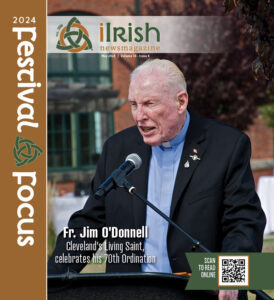
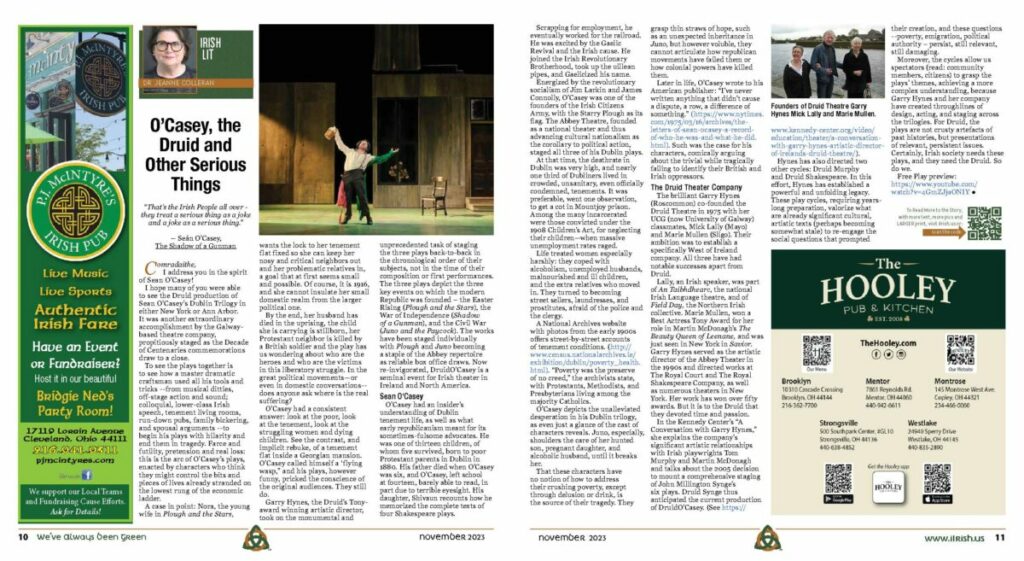

Monthly newsmagazine serving people of Irish descent from Cleveland to Clearwater. We cover the movers, shakers & music makers each and every month.
Since our 2006 inception, iIrish has donated more than $376,000 to local and national charities.
GET UPDATES ON THE SERIOUS & THE SHENANIGANS!